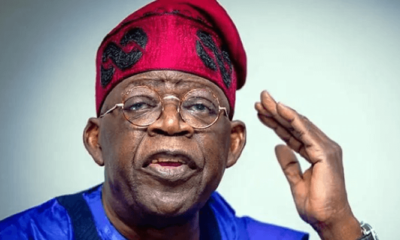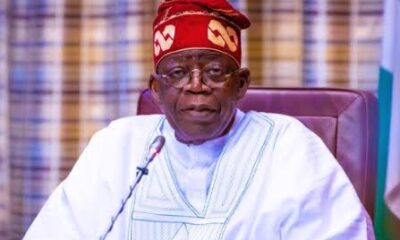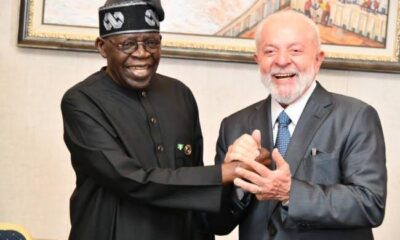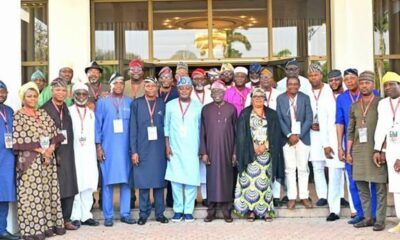World News
Tinubu greets John Mahama on return to power as Ghana President
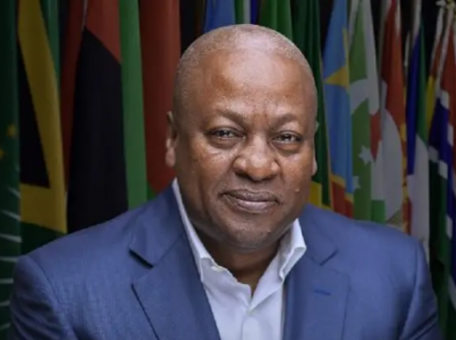
Ghana’s political landscape witnessed a historic shift over the weekend as former President John Dramani Mahama reclaimed the presidency.
Representing the National Democratic Congress (NDC), Mahama triumphed over Vice President Mahamudu Bawumia, the candidate of the ruling National Patriotic Party (NPP), in Saturday’s election.
The victory marks Mahama’s return to power, years after serving as Ghana’s president from 2012 to 2017. His win signals a new chapter for the country, with expectations of renewed policies and governance under his leadership.
Nigeria’s President Bola Ahmed Tinubu extended his congratulations to Mahama, engaging him in a telephone call to express optimism about the impact of his leadership. Tinubu expressed hope that Mahama’s presidency would contribute to the stability and progress of the Economic Community of West African States (ECOWAS).
“President Mahama’s return to Jubilee House is a testament to the trust Ghanaians have in his leadership. His second tenure will undoubtedly contribute to the shared vision of peace and economic integration in our region,” President Tinubu remarked.
Although, the results was yet to be announced last night by the electoral commission, Mahama is believed to have score 56% to the vice president’s 41%.
Bawumia had nevertheless congratulated Mahama and conceded defeat.
“The people have voted for change,” he said.
The elections come amid the country’s worst economic crisis in a generation, which saw the cost of basic goods shoot up, while young people struggled to get jobs and the country was unable to repay its debts.
The Electoral Commission (EC) said results had been delayed because supporters of the two main parties were impeding the process and it had asked the police to clear the collation centres.
Mahama’s supporters have taken to the streets around the country to celebrate, cheering, waving flags, blowing horns and spinning motorbikes.
“I’m so excited for this victory,” Salifu Abdul-Fatawu told the BBC in the central city of Kumasi.
He said he hoped it would mean that he and his sibling would get jobs, while the price of food and fuel would come down.
Even NPP supporter Nana accepted that “my party is NPP, but whatever they did was not good.
“The system was so bad in an election year and so most people were not happy.”
Although the election has generally been peaceful, two people were shot dead on Saturday during an election dispute in the northern area of Nyankpala, while the electoral commission office in another northern town, Damongo, has been destroyed, allegedly by NDC supporters angry at the delays in announcing the results.
Ghanaians had expected the first results to be announced within hours of the polls closing, however the head of the Electoral Commission has asked for patience, noting that it has 72 hours to declare the results.
Warehouses have also been looted in both Damongo, and Tamale, also in the north.
Bawumia said he was basing his concession on internal tallies from the governing New Patriotic Party (NPP).
He said these showed Mahama had won “decisively”, while the opposition National Democratic Congress (NDC) had also won the parliamentary election.
Mahama confirmed that Bawumia had called to congratulate him on his “emphatic victory”.
The NDC earlier said that its internal results showed Mahama had won 56% of the vote against 41% for Bawumia.
The vice-president said he was accepting defeat before the official announcement of the results “to avoid further tension and preserve the peace of our country”.
The US embassy in the capital, Accra, has congratulated Ghana on “a successful election”.
President Nana Akufo-Addo is stepping down after reaching the official limit of two terms in office.
Mahama, 65, previously led Ghana from 2012 until 2017, when he was replaced by Akufo-Addo. Mahama also lost the 2020 election so this victory represents a stunning comeback.
Since the return of multi-party politics to Ghana in 1992, the NDC and the NPP have alternated in power.
No party has ever won more than two consecutive terms in power – a trend that looks set to continue.
Mahama’s previous time in office was marred by an ailing economy, frequent power-cuts and corruption scandals.
However, Ghanaians hope it will be different this time round.
The president-elect will be sworn in on January 7.
In a statement issued yesterday by his Special Adviser on Information and Strategy, Bayo Onanuga, President Tinubu, who chairs ECOWAS, praised the Ghanaian people for their commitment to democracy.
The elections, which included both presidential and parliamentary contests, were widely praised for their peaceful conduct.
Tinubu described the event as “a shining example of how democracy remains the cornerstone of political stability, economic development and social justice in Africa.”
The Nigerian leader also lauded Dr. Bawumia for conceding defeat ahead of the official announcement by the Ghana’s Electoral Commission.
“Dr. Bawumia’s magnanimity in defeat reinforces Ghana’s position as a beacon of democratic values on the continent,” Tinubu said.
Tinubu also expressed gratitude to outgoing President, Nana Akufo-Addo, for his exemplary leadership, saying: “President Akufo-Addo’s contributions to Ghana’s progress and regional stability will be remembered as a vital chapter in the nation’s history”.
ECOWAS Commission President, Dr. Omar Alieu Touray and former Ekiti State Governor Kayode Fayemi have congratulated Mahama.
Touray congratulated Ghanaian people on their successful and generally-peaceful elections.
The President of the commission also congratulated Mahama on his victory and equally commended Bawumia for his timely concession, saying it demonstrated his statesmanship and love for country.
Fayemi applaudsGhana on election
In a statement, Fayemi also commended Bawumia for his gracious concession speech, noting that “his acceptance of the electoral outcome in the spirit of peace and national unity exemplifies the very best of African political leadership”.
Fayemi noted that Ghana had become a model of democracy for Africa, emphasising the importance of respecting the will of the people and the supremacy of democratic principles.
The former governor said: ‘’As a friend to both men and a committed advocate of democratic principles across Africa, I extend my heartfelt congratulations to the President-Elect of Ghana, John Dramani Mahama, on his resounding victory in the recently concluded general elections. This triumph reflects the trust and confidence the people of Ghana have in his leadership and vision for their country.
‘’I equally commend Dr. Mahamamudu Bawumia, presidential candidate of the New Patriotic Party (NPP), for his gracious concession speech. His acceptance of the electoral outcome in the spirit of peace and national unity exemplifies the very best of African political leadership.
‘’Dr. Bawumia’s decision to place the interest of Ghana above personal ambition reinforces the values of democracy and demonstrates a maturity that will undoubtedly serve as a model for political actors across the continent.“
‘’As Africans, we must draw lessons from Ghana’s example. The supremacy of the people’s will is the cornerstone of democracy and the desire to serve must always align with the mandate freely given by the electorate, not through coercion or manipulation.
“Ghana has set high standards by proving that democracy can thrive in Africa when institutions are allowed to function independently and political actors prioritize the collective good over individual aspirations.
“As Nigeria and other African nations continue to strengthen their democratic foundations, the Ghanaian experience provides a blueprint for conducting elections that are credible, peaceful, and reflective of the people’s choice.
“I therefore urge all political actors across the continent to emulate the exemplary conduct displayed by both President-Elect Mahama and Dr. Bawumia, who through their actions have deepened the democratic culture in their country and solidified its position as a beacon of hope and a model for democracy in Africa.”


